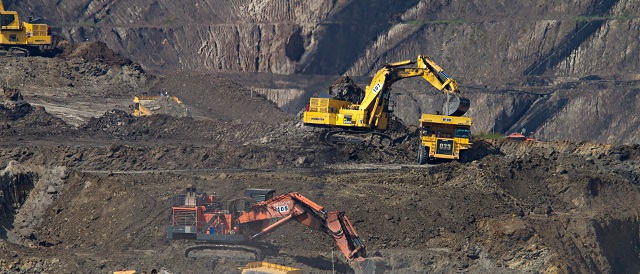conflict
China Poised To Cut Off US Military From Key Mineral As America’s Own Reserves Lay Buried Under Red Tape

 From the Daily Caller News Foundation
From the Daily Caller News Foundation
By Nick Pope
China is planning to restrict exports of a key mineral needed to make weapons while a U.S. company that could be reducing America’s reliance on foreign suppliers is languishing in red tape, energy experts told the Daily Caller News Foundation.
The Chinese government announced on August 15 that it will restrict exports of antimony, a critical mineral that dominates the production of weapons globally and is essential for producing equipment like munitions, night vision goggles and bullets that are essential to national security, according to the Center for Strategic and International Studies (CSIS). Perpetua Resources, an American mining company, has been navigating red tape for years to develop a mine in Valley County, Idaho, that could decrease reliance on the Chinese supply of antimony, but the slow permitting process is getting in the way, energy experts told the DCNF.
It can take years to secure all the necessary approvals and permits to develop a mine like the one Perpetua Resources is trying to operate. One of the key permitting laws in place is the National Environmental Policy Act (NEPA), which also applies to federal land management actions and the construction of certain public infrastructure projects like highways.
“After six years of planning and early engagement, we began the [NEPA] permitting process in 2016. We are now eight years into NEPA,” a Perpetua Resources spokesperson told the DCNF. The company is hoping to extract antimony from the largest known deposit in the U.S., and Perpetua Resources’ development could also produce millions of ounces of gold as well.
Diana Furchtgott-Roth, director of the Heritage Foundation’s Center for Energy, Climate and Environment, argues that the Perpetua Resources mine poses real environmental considerations that should be addressed, but production in the U.S. is almost certainly cleaner than production that takes place in China. Moreover, depending on China for raw materials needed to produce key defense equipment poses a clear national security risk, Furchtgott-Roth said.
“The United States has the highest environmental standards in the world for its mines, as well as for some other things, too,” Furchtgott-Roth told the DCNF. “It’s a huge national security risk. Given what we’ve seen with Russia cutting off supplies of natural gas to Europe, we know that countries can cut off important supplies to other countries.”
“If the administration wants to pursue policies that push electric vehicles, green energy and other mineral-intensive technologies, it should look to streamline the permitting process across the board rather than selectively pursuing reform for some favored types of development and not for others,” Furchtgott-Roth added.
Steve Coonen, a former Department of Defense (DOD) official who focused on technology exports to China, agreed that relying on China for raw materials needed to produce crucial technologies presents a clear national security risk.
“The United States has all the rare earth elements it needs, not too dissimilar from its energy requirements,” Coonen told the DCNF. “However, Democrats have enchained U.S. industry by prohibiting the extraction of these materials for misplaced and ill-informed ecological reasons at a significant risk to national security and the United States’ long-term economic health.”
China is responsible for just under 50% of the world’s antimony production, and it is also the source of 63% of the U.S.’ current antimony imports, according to CSIS. The U.S., meanwhile, did not mine any “marketable” antimony in 2023, according to CNBC.
China’s recently announced export restrictions for antimony will take effect on Sept. 15, according to CNBC. To many in the industry, China moving to curb antimony exports would have come as a surprise just a few months ago, so the country’s decision to take action comes across as “quite confrontational in that regard,” Lewis Black, CEO of Canadian mining company Almonty Industries, told the outlet.
In addition to antimony, China has also flexed its muscles by restricting exports of other critical minerals that it dominates globally, like germanium and gallium, since 2023.
“The United States has some of the highest permitting standards in the world, and that’s something to be proud of. But NEPA gets criticism for being inefficient, and much of that criticism is justified,” the Perpetua Resources spokesperson told the DCNF. “When we are talking about minerals we need for America’s national and economic security — not to mention our clean energy future — we need an efficient regulatory process that still maintains robust protections for communities and the environment.”
The company is anticipating that the process — from initial deposit identification to the beginning of mineral extraction from the mine site — will take 18 years, the Perpetua Resources spokesperson told the DCNF. However, the spokesperson added that NEPA has been beneficial for transparency with the public and allowing stakeholder communities to weigh in about the project.
Nevertheless, Perpetua Resources “absolutely supports a commonsense, bipartisan approach to permitting reform” because “good projects should not wither in red tape.”
The antimony curbs may be even more pressing given existing concerns about the strength of America’s defense-industrial base amid wars in the Middle East and Europe, as well as rising tensions with China over Taiwan. Many experts have cautioned that the U.S. is allowing itself to become too dependent on an adversarial China’s mineral supplies at a time when those minerals are playing a much larger role in the American economy, thanks in part to the Biden administration’s massive green energy agenda.
“In the mid-twentieth century, domestic mining accounted for 90% of the U.S.’s antimony consumption. Today, the U.S. no longer mines antimony; instead, it relies on China, its chief geopolitical rival, for over 60% of its antimony imports,” Quill Robinson, an associate fellow in CSIS’ Energy Security and Climate Change Program, told the DCNF. “Effective China de-risking requires reducing reliance up and down the value chain.”
Independent West Virginia Sen. Joe Manchin and Republican Wyoming Sen. John Barrasso teamed up to introduce a major permitting reform bill in July, designing the package to simplify the regulatory hurdles that major infrastructure and development projects must clear and expedite timelines without totally defanging regulators’ ability to ensure that environmental concerns and considerations are addressed. That bill has not yet come up for a vote in the Senate.
“There are legitimate environmental challenges that need to be mitigated for projects like this,” Arnab Datta, the Institute for Progress’ director of infrastructure policy, told the DCNF. However, government agencies are more strongly incentivized to avoid legal challenges of their reviews from third parties than they are to thoroughly review the more significant environmental concerns, meaning that regulators tend to chew up lots of time on those minor points and ultimately extend the timelines for permitting, Datta explained.
“The uncertainty from permitting and litigation compounds the challenge of reaching production in what’s often a volatile and uncertain market environment for these commodities,” Datta, who also works for Employ America as a managing director of policy implementation, continued. “These companies need a process with certainty and reasonable timelines and also support that helps mitigate the volatility that arises from China’s actions in the market.”
Featured Image: Photo by Dominik Vanyi on Unsplash
conflict
Zelensky Alleges Chinese Nationals Fighting for Russia, Calls for Global Response

 Sam Cooper
Sam Cooper
Ukrainian President Volodymyr Zelensky announced Tuesday that his forces have captured two Chinese citizens fighting as part of the Russian army in eastern Ukraine, alleging “there are many more Chinese citizens in the occupier’s units.” The stunning revelation could inject a volatile new dimension into ceasefire negotiations between the United States and Russia—and intensify already fraught tensions over Taiwan.
Zelensky shared the news in an X post, accompanied by video of one of the captured men—an Asian male in beige fatigues, hands bound with zip ties, visibly distressed as he gestures to a Ukrainian camera operator. The video shows the man making whirring sounds, crouching instinctively as if a drone is circling above and opening fire—then glancing up and uttering the English word, “commander.”
“We have information suggesting that there are many more Chinese citizens in the occupier’s units than just these two,” Zelensky wrote on X. “We are currently verifying all the facts—intelligence, the Security Service of Ukraine, and the relevant units of the Armed Forces are working on it.”
The president said he has instructed Ukraine’s foreign minister to urgently contact Beijing to clarify how China intends to respond.
“Russia’s involvement of China, along with other countries, whether directly or indirectly, in this war in Europe is a clear signal that Putin intends to do anything but end the war,” Zelensky wrote. “He is looking for ways to continue fighting. This definitely requires a response. A response from the United States, Europe, and all those around the world who want peace.”
Zelensky added that Ukrainian authorities had recovered documents, bank cards, and personal data from the two prisoners—material that could be pivotal in discovering the nature of China’s involvement.
If verified, the presence of Chinese nationals fighting for Russia could carry sweeping geopolitical implications. It would complicate delicate U.S.-Russia negotiations aimed at exploring a conditional ceasefire, and could have indirect ramifications on the plans of Washington, Tokyo, and Taipei in their growing confrontation with Beijing.
China has repeatedly denied providing direct military support to Russia. Zelensky’s statement marks the first time Ukraine has publicly alleged that Chinese nationals are embedded in Russian combat units—an allegation that, if substantiated, could alter the strategic calculus in both Eastern Europe and the Indo-Pacific.
Responding to Zelensky’s claims, Tom Shugart, a senior defense analyst at the Center for a New American Security and a former U.S. Navy officer, emphasized that the strategic implications hinge on whether the Chinese nationals were acting as mercenaries or state-directed personnel. “If the PRC is actively providing soldiers to fight in Ukraine, that would be altogether different—a possible sign of a real Axis that may best be resisted wherever it is fighting,” he wrote on X.
This is a developing story. The Bureau will continue to report as further details emerge.

Recommend The Bureau to your readers
conflict
“HELL WILL RAIN DOWN”: Trump unleashes U.S. military on Yemeni Houthis

 MxM News
MxM News
Quick Hit:
President Trump ordered a massive military assault on Iranian-backed Houthi forces in Yemen on Saturday, vowing to unleash “overwhelming lethal force” after months of attacks on American and allied vessels in the Red Sea.
Key Details:
-
Trump announced the strikes in a Truth Social post, stating, “Today, I have ordered the United States Military to launch decisive and powerful Military action against the Houthi terrorists in Yemen.”
-
He criticized former President Joe Biden for failing to contain the Houthis, saying his response was “pathetically weak” and emboldened the group’s ongoing attacks on commercial and military vessels.
-
The U.S. Navy’s USS Harry S. Truman carrier strike group, along with three destroyers and a cruiser, launched the assault, targeting radars, air defenses, and missile systems used to disrupt shipping lanes.
CENTCOM Forces Launch Large Scale Operation Against Iran-Backed Houthis in Yemen
On March 15, U.S. Central Command initiated a series of operations consisting of precision strikes against Iran-backed Houthi targets across Yemen to defend American interests, deter enemies, and… pic.twitter.com/u5yx8WneoG
— U.S. Central Command (@CENTCOM) March 15, 2025
Diving Deeper:
President Trump escalated U.S. military action against Iran-backed Houthi rebels on Saturday, ordering airstrikes on targets in Yemen in response to the group’s repeated attacks on Red Sea shipping. Trump, in a Truth Social post, declared that the U.S. military would not tolerate continued aggression and vowed an overwhelming response.
“The Houthi attack on American vessels will not be tolerated,” Trump wrote. “We will use overwhelming lethal force until we have achieved our objective.” He directly warned the Houthis, stating, “YOUR TIME IS UP, AND YOUR ATTACKS MUST STOP, STARTING TODAY. IF THEY DON’T, HELL WILL RAIN DOWN UPON YOU LIKE NOTHING YOU HAVE EVER SEEN BEFORE!”
The strikes, carried out by U.S. Central Command, targeted missile sites, drone launch facilities, and command centers used by the Houthis to strike commercial and military vessels in the Red Sea. U.S. warships and carrier-based fighter jets participated in the mission, marking a significant escalation in efforts to protect international shipping routes.
Trump also issued a direct warning to Iran, demanding that its support for the Houthis “must end immediately.” Addressing Tehran, Trump wrote, “Do NOT threaten the American People, their President…or Worldwide shipping lanes. If you do, BEWARE, because America will hold you fully accountable and we won’t be nice about it!”
The strikes come after more than a year of escalating attacks by the Houthis, who have targeted over 100 merchant vessels, sunk at least two, and killed multiple sailors since the Israel-Hamas war began. Trump pointed to Biden’s failures in handling the crisis, noting that “it has been over a year since a U.S.-flagged commercial ship safely sailed through the Suez Canal, the Red Sea, or the Gulf of Aden.”
With Trump’s order, the U.S. is making clear that hostile actions in the Red Sea will not go unanswered. As military operations continue, all eyes will be on whether the Houthis and their Iranian backers heed the warning—or face even greater firepower from the U.S. military.
-

 2025 Federal Election1 day ago
2025 Federal Election1 day agoResearchers Link China’s Intelligence and Elite Influence Arms to B.C. Government, Liberal Party, and Trudeau-Appointed Senator
-

 2025 Federal Election2 days ago
2025 Federal Election2 days agoRCMP memo warns of Chinese interference on Canadian university campuses to affect election
-

 COVID-1917 hours ago
COVID-1917 hours agoCDC Vaccine Safety Director May Have Destroyed Records, Says Sen. Ron Johnson
-

 Business16 hours ago
Business16 hours agoCanadian Police Raid Sophisticated Vancouver Fentanyl Labs, But Insist Millions of Pills Not Destined for U.S.
-

 2025 Federal Election7 hours ago
2025 Federal Election7 hours ago‘Sadistic’ Canadian murderer claiming to be woman denied transfer to female prison
-

 COVID-191 day ago
COVID-191 day agoFauci, top COVID officials have criminal referral requests filed against them in 7 states
-

 2025 Federal Election1 day ago
2025 Federal Election1 day agoCarney needs to cancel gun ban and buyback
-

 Bjorn Lomborg1 day ago
Bjorn Lomborg1 day agoThe stupidity of Net Zero | Bjorn Lomborg on how climate alarmism leads to economic crisis










